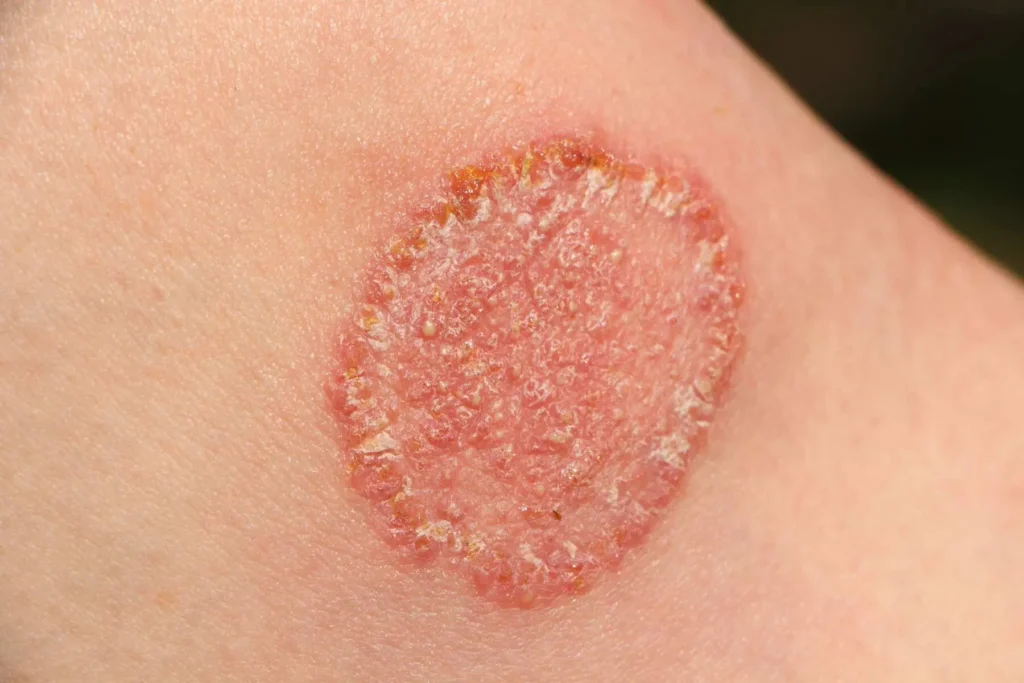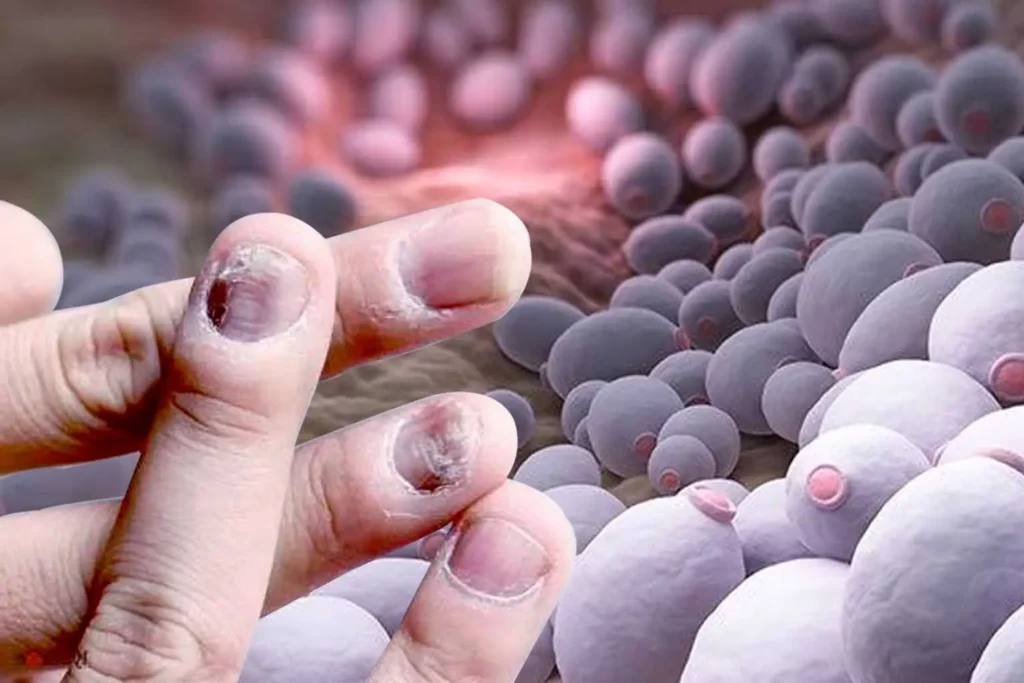Homeopathic Treatment for Fungal Infection:
Homeopathic treatments for fungal infections aim to boost the immune system and tackle the root causes. Remedies such as Sulphur, Thuja, and Graphites are commonly used to address various fungal issues, including athlete’s foot, ringworm, and skin infections caused by fungi. These natural treatments are effective and do not come with harmful side effects.
At Gupta Homoeo Clinic, we have extensive experience in treating fungal infections through homeopathy. We take pride in our high success rate for conditions such as athlete’s foot, ringworm, and other fungal issues. For more detailed information, please visit our fungal infection page, and allow our skilled doctors to offer you effective solutions without side effects.
What are Fungal Infections?
Fungal infections are caused by an overgrowth of fungi, including yeasts and molds, which thrive in warm and moist areas of the body. These infections can affect the skin, nails, scalp, and mucous membranes, progressing from mild to more persistent and severe forms. Common types of fungal infections include athlete’s foot, ringworm, jock itch, and nail fungus. For a specific understanding of what is candida infection, you can visit our detailed guide.

Types of fungal Infections
1. Superficial fungal infections can affect the skin and nails, leading to various conditions such as:
- Ringworm (Tinea Corporis): This presents as a circular, itchy rash on the body.
- Athlete’s Foot (Tinea Pedis): This condition impacts the feet, resulting in itching and peeling skin.
- Jock Itch (Tinea Cruris): This manifests as a red, itchy rash in the groin area.
- Scalp Ringworm (Tinea Capitis): This can cause bald patches on the scalp.
- Onychomycosis (Tinea Unguium): This refers to a fungal infection affecting the nails.
2. Cutaneous Fungal Infections: These affect the skin and mucous membranes, including:
- Candidiasis: This refers to yeast infections, such as oral thrush or vaginal yeast infections.
3. Subcutaneous Fungal Infections: These involve deeper layers of the skin, such as:
- Sporotrichosis: An infection that occurs from cuts, leading to the formation of nodules.
- Chromoblastomycosis: A chronic skin infection characterized by warty growths.
4. Systemic Fungal Infections : impact internal organs, including:
- Histoplasmosis: A lung infection caused by exposure to bird droppings.
- Valley Fever (Coccidioidomycosis): A lung infection resulting from fungi found in desert environments.
- Aspergillosis: An infection affecting the lungs and other organs, particularly in individuals with weakened immune systems.
- Cryptococcosis: An infection that targets the lungs and brain, often seen in those who are immunocompromised.
5. Opportunistic Fungal Infections : primarily affect individuals with weakened immune systems, such as:
- Aspergillosis and Candida Infections: These are serious infections that can occur in those with compromised immunity.
Common Symptoms of Fungal Infections
Symptoms may vary based on the site of infection, but common signs include:
- Red, dry, and scaly areas on the skin, often appearing around the ears, neck, and other folds.
- Thickened, discolored nails with changes in texture.
- Deep cracks or fissures in the skin, particularly between the toes or fingers.
- Pain or irritation at the site of infection.
- Persistent white plaques or rashes in warm, moist areas of the body.
- Chronic symptoms that do not respond well to standard treatment.
Causes of Fungal Infection
Fungal infections occur when fungi, which are tiny organisms that prefer warm and damp conditions, multiply excessively. The primary factors contributing to these infections include:

- Exposure to Fungi: Coming into contact with surfaces, soil, or items that harbor fungal spores, such as public showers, swimming pools, or gym floors.
- Weakened Immune System: Individuals with compromised immune systems (for instance, those with HIV/AIDS, undergoing chemotherapy, or living with diabetes) are at a higher risk for fungal infections.
- Moist and Warm Environments: Fungi flourish in humid, warm areas, making places like the feet, groin, and armpits common locations for infections.
- Antibiotic Use: Extended use of antibiotics can disturb the natural balance of bacteria in the body, allowing fungi like Candida to proliferate unchecked.
- Poor Hygiene: Not keeping up with personal hygiene can raise the chances of getting fungal infections, particularly in areas like the feet and genitals.
- Skin Injuries: Any cuts, scrapes, or other wounds that break the skin can allow fungi to enter, potentially leading to infections such as sporotrichosis.
- Contact with Infected Individuals: Fungal infections can be transmitted through direct contact with infected people or by using contaminated items like towels or razors.
- Underlying Health Conditions: Long-term health issues like diabetes, obesity, and poor circulation can create conditions that make it easier for fungal infections to develop.
Do’s & Don’ts of Fungal Infection
Do’s:
- To keep your skin dry : Make sure to thoroughly dry any areas that are affected, as moisture can encourage fungal growth.
- Opt for clean, breathable clothing : select loose-fitting cotton garments to help minimize moisture accumulation.
- Utilize antifungal medication : Prescribed by your doctor to effectively manage infections.
- Remember to wash your hands regularly : Especially after coming into contact with infected areas, to prevent the spread of the infection.
- Don’t forget to disinfect personal items : Such as shoes, towels, and combs to help avoid reinfection.
Don’ts:
- Avoid Scratching Infected Areas: Scratching can worsen the infection and lead to more irritation.
- Steer Clear of Tight-Fitting Shoes: Shoes that are too tight can trap moisture, which raises the risk of fungal infections like athlete’s foot.
- Don’t Share Personal Items: To prevent cross-contamination, avoid sharing towels, shoes, or razors.
- Pay Attention to Symptoms: If you notice any symptoms, seek treatment early to prevent them from getting worse.
- Consult a Professional Before Using Over-the-Counter Products: Stick to prescribed treatments to avoid ineffective or potentially harmful self-medication.
Homeopathic Approach to Treating Fungal Infections
Homeopathic treatment for fungal infection takes a holistic, patient-centered approach, focusing on strengthening the immune system and treating the root causes. Unlike standard treatments that may suppress symptoms, homeopathy uses remedies tailored to each individual’s health status, symptoms, and specific characteristics of the infection.
Why Choose Homeopathy for Fungal Infections?
Homeopathic treatment for fungal infection remedies are designed to be gentle, focusing on the person as a whole. They address both the symptoms and the root causes, aiming for long-term relief without adverse effects. By strengthening the immune system, homeopathy not only treats the infection but also helps prevent recurrence. This holistic approach is also beneficial in areas like herpes virus homeopathic treatment. Additionally, if you are seeking homeopathy for skin fungal infection then fungal infection skin homeopathy provide targeted relief for skin-related fungal issues.
Consultation at Gupta Homoeo Clinic
Our approach involves a detailed review of your medical history, current symptoms, and overall health to prescribe the most effective homeopathic remedies for fungal infections. Homoeopathic remedies for infertility and chronic skin conditions like fungal infections are our specialties.
If you are interested in learning more about how homeopathy can help treat fungal infections or wish to book a consultation, please visit our website at contact us directly. We are dedicated to helping you to achieve optimal skin health and overall well-being with homeopathic treatment for fungal infection.

Dr. Sachin Gupta
Homoeopathic Physician MD(Hom.)
Renowned homeopathic physician and skin specialist in Jaipur, dedicated to providing personalized, effective treatments.

Dr. Saveena Gupta
Homoeopathic Physician BHMS, DNHE
Highly regarded homeopathic doctor in Jaipur, specializing in women’s health and gynecological disorders.
Homeopathic Treatments for Fungal Infections
Below are common homeopathic remedies used to manage fungal infections, each chosen based on the specific symptoms and constitution of the patient:
- Sulphur: This remedy is useful for itching, burning, and redness, especially when symptoms worsen with heat. Sulphur soothes irritated skin and aids the healing process.
- Sepia: Often used to treat ringworm and dry, chapped skin. It also supports immune function, helping the body resist future infections.
- Thuja: Effective for nail fungus, particularly for thickened, brittle nails with stubborn, chronic fungal infections.
- Graphites: Beneficial for infections in skin folds with thick, sticky discharge, often resembling eczema-like conditions.
- Calcarea Carbonica: Suitable for individuals with chronic fungal infections and symptoms of fatigue or weakness, as it helps restore immune strength and improve resilience.
Note: Please do consult with your doctor first, before to take any medicine. The remedies mentioned over here are for the information only. We do not recommend to take any medicine without taking prior consultation. Homeopathy treatments for any diseases and treatment vary according to your body symptoms and structure.
Disclaimer
The information shared about fungal infections and their treatments is meant for educational purposes only and should not be taken as medical advice. It’s essential to consult a qualified healthcare professional for an accurate diagnosis and suitable treatment options. Results can vary from person to person, so it’s important to seek proper care for any medical issue.
OUR REVIEWS

For years, chronic stubborn fungal infections had been plaguing me. Dr. Gupta’s homeopathic treatment worked gradually, targeting the root cause. Redness and itching faded within weeks, but the real success is staying symptom-free for over six months. I truly appreciate the long-lasting relief.

Following the use of numerous topical treatments, my skin became increasingly hypersensitive, and the infection worsened. Dr. Gupta’s homeopathic treatment not only healed my fungal rash but also restored my skin’s health. The recovery was clean and calm without any irritation and no side effects. I have full trust in his natural approach.

Intermittent vaginal infections made me reliant on antifungal pills every few weeks. Unlike others, Dr. Gupta focused on homeopathy which brought sustained results. Over time, my symptoms like discomfort, discharge and irritation significantly decreased. Today, I feel more confident and healthier too. Highly recommended!

I suffered from a nagging obstinate fungal infection of the scalp which was not resolving at all. Dr. Gupta diagnosed it swiftly and provided a step-by-step treatment plan. The infection resolved, and even my hair fall improved. His protocol is effective, and his expertise is unmatched.

Every monsoon season, I would suffer from ringworm in the exact same spots. I no longer have to endure the burning creams and steroids because of Dr. Gupta’s remedies. Though steam clearing was required at first, now it’s all gone for good.

I had tried everything—powders, creams, tablets—but the infection always returned. Dr. Gupta’s longer but targeted homeopathic treatment broke the cycle, and the solution was permanent and impactful. I haven’t had a recurrence for almost a year now. I’ve finally found lasting peace of mind and a relief from continuous anxiety.
FAQs
Q 2. What are the different types of fungal infections?
Answer – Common types of fungal infections include athlete’s foot, ringworm, jock itch, and yeast infections, which can manifest as oral thrush or vaginal candidiasis.
Q 3. What causes fungal infections?
Answer – Fungal infections happen when fungi flourish in warm, moist conditions, particularly if someone’s immune system is compromised, hygiene is poor, or if antibiotics are taken for a long time, which can upset the body’s natural balance.
Q 4. How are fungal infections treated?
Answer – Fungal infections are typically treated with antifungal creams that are applied directly to the skin, oral medications, or sometimes a combination of both. Additionally, some individuals might explore homeopathic treatments or natural remedies as part of their overall care.
Q 5. How are fungal infections treated in homeopathy?
Answer – Homeopathic treatments focus on strengthening the immune system and restoring balance, using remedies like Sulphur, Thuja, and Natrum muriaticum, tailored to individual symptoms.





